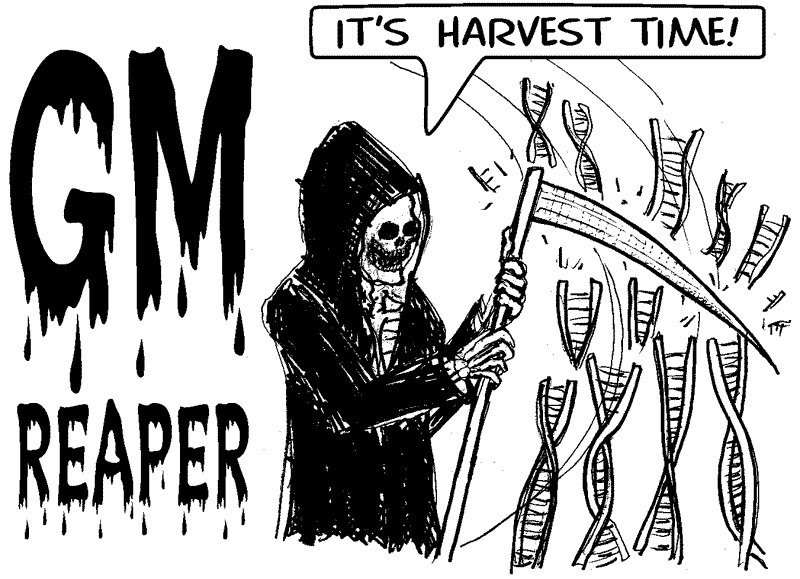|
Environmental Impacts of
GM Crops:
GM crops are usually made by crossing the genes of unrelated species, in an attempt to transfer a desired trait eg. a fish gene was transferred to tomatoes! This never happens in nature and the environmental repercussions are unknown and potentially dangerous. These include the destruction of agriculturally beneficial insects and soil microbes, loss of native seed varieties, the creation of new plant diseases, destruction of biodiversity and creation of super-weeds. There are also serious risks to health of humans and livestock, which will be covered in a separate article. (Those interested may see www.iamnolabrat.com)
 Most GM crops are engineered for 2 traits ‘Herbicide Tolerance’ (enabling crops to resist specific herbicides/weedicides usually made by the same company, eg. Monsanto’s RoundUp) and ‘Insect Resistance’ (such as Bt crops, where a gene from the bacterium Bacillus thuringiensis creates a toxin which destroys a specific pest). Most GM crops are engineered for 2 traits ‘Herbicide Tolerance’ (enabling crops to resist specific herbicides/weedicides usually made by the same company, eg. Monsanto’s RoundUp) and ‘Insect Resistance’ (such as Bt crops, where a gene from the bacterium Bacillus thuringiensis creates a toxin which destroys a specific pest).
The Bt toxin produced in Bt Crops is present in every cell of the plant, so when the plant decomposes, a considerable amount of the toxin may reach the soil. The renowned soil ecologist Guenther Stotsky, found that toxins from Bt crops do not disappear. They bind to soil particles, and are not broken down by soil microbes. Bt toxins can build up in the soil killing sensitive soil organisms - the foundation of ecosystems.
Guenther Stotzky also found that the Bt toxin released by the roots of GM plants was the same toxin that has caused the destruction of Monarch butterflies. Research carried out by the Scottish Crop Research Institute on potatoes genetically modified to produce a pesticide also harms ladybirds, which are farmers' friends as they control pests. According to the US Fish and Wildlife Services, ‘Monsanto’s spray chemical ‘Round-out’ (a herbicide) already threatens 74 endangered species in the US. In the United States, bees are dying in dramatic numbers and some experts believe that the large-scale use of GM plants in the US could be a factor.
In a study by Marc Lappé and Britt Bailey of the Centre for Ethics & Toxics (CETOS), genetically modified Bt endotoxin remains in the soil for at least 18 months and can be transferred to wild plants creating super-weeds that are resistant to the pests that would otherwise control them, potentially disturbing the balance of nature. A study by the National Academy of Science, USA, says, “…concern surrounds the possibility of genes for resisting pests being passed from cultivated plants to their weedy relatives, potentially making the weed problem worse. This could pose a high cost to farmers and threaten the ecosystem.” Argentina and Brazil, growers of GM crops, have witnessed an epidemic of herbicide-resistant weeds like ragweed, water hemp, giant ragweed, Palmer pigweed. Biotechnology firms thereupon develop new GM crops that tolerate heavier applications of chemicals, further promoting toxic agro-chemicals.
GM seed is promoted by a handful of multinational seed corporations who control more than half of the global seed market. These corporations impose strict patent laws, technology use agreements and even terminator technology, so that farmers are unable to save these seeds. Once GM seeds are introduced, almost all other traditional and native varieties are wiped out, as can be seen after Bt Cotton was introduced in India. The destruction of agro-diversity impacts the right of choice of both farmers and consumers.
Our ecological systems are extremely complex. Changes can be observed only over a long period of time, but can cumulatively be extremely drastic and often irreversible. Introducing unnatural living organisms such as Genetically Modified seed is a risky and irreversible experiment as their spread cannot be easily halted. Many countries have stopped the entry of GM. The Indian public must also demand that the Central and State governments proceed on the basis of the Precautionary Principle to halt GM , as the diversity of our ecosystems and agro-systems is at stake, apart from the health of present and future generations.
Dilnavaz Variava
Former Member of National Board for Wildlife, CEO of WWF-India and Vice Pres of BNHS. Former Member of Govt of Maharashtra Expert Committee on 25 Year Plan for Agriculture.
|
|
Related Stories:
 About GM Corps About GM Corps
Read more
 Environmental Risks of Environmental Risks of
GM Crops
Read more
 Everything You Eat Everything You Eat
Will Be GM
Read more
 Wrong Bill by the Wrong Bill by the
Wrong People
Read more
Who Benefits from GM Crops?
A study by Friends of the Earth International:
Read more
Monsanto’s True Colours:
Read more
NEWS:
USDA to allow Biotech Corp to test their own crop:
Read more
NEWS:
Scientists discount arguments that GM increases yield:
Read more
ProQuest/CSA site on GM Food:
Read more

|
|







 Most GM crops are engineered for 2 traits ‘Herbicide Tolerance’ (enabling crops to resist specific herbicides/weedicides usually made by the same company, eg. Monsanto’s RoundUp) and ‘Insect Resistance’ (such as Bt crops, where a gene from the bacterium Bacillus thuringiensis creates a toxin which destroys a specific pest).
Most GM crops are engineered for 2 traits ‘Herbicide Tolerance’ (enabling crops to resist specific herbicides/weedicides usually made by the same company, eg. Monsanto’s RoundUp) and ‘Insect Resistance’ (such as Bt crops, where a gene from the bacterium Bacillus thuringiensis creates a toxin which destroys a specific pest). 